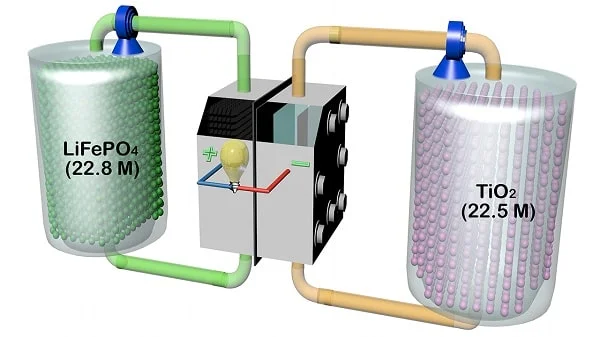Flow batteries, also known as redox flow batteries or simply “flow cells,” are a unique and versatile type of energy storage technology. They operate on the principle of electrochemical reactions between two electrolyte solutions that flow through separate chambers, with energy stored in large tanks, making them distinct from conventional solid-state batteries. Here’s an overview of flow batteries:
Composition and Operation
Flow batteries consist of two tanks of electrolyte solutions, typically made of metal salts, and two electrochemical cells separated by a membrane. During charging or discharging, the electrolytes flow through the cells and generate electricity.
Working Principles
During discharging, the electrolytes in the two tanks are pumped through their respective cells. As the electrochemical reactions occur, electrons are transferred between the electrolytes, generating electrical energy. During charging, the process is reversed, restoring energy to the tanks.

Advantages
Scalability: Flow batteries can be easily scaled up by increasing the size of the tanks, making them suitable for a wide range of applications, from grid-scale energy storage to small residential systems.
High Cycle Life: Flow batteries can endure a high number of charge and discharge cycles, providing a long operational life.
Separation of Energy and Power: The power output of a flow battery is determined by the size of the electrochemical cells, while the energy capacity is determined by the size of the tanks, allowing for flexibility in design.
Enhanced Safety: Flow batteries typically use non-flammable and non-toxic electrolytes, enhancing their safety profile.
Disadvantages
Lower Energy Density: Flow batteries generally have lower energy density compared to some solid-state batteries, which can result in larger physical footprints.
Complex Design: The plumbing and control systems required for flow batteries can be more complex than those in traditional batteries.
Cost: Flow batteries are often more expensive to manufacture and maintain, which can impact their economic viability.
Common Applications
Grid Energy Storage: Flow batteries are used in large-scale grid energy storage systems to store excess renewable energy and provide stable power during peak demand.
Microgrids: Flow batteries are used to provide reliable and stable power in remote or off-grid locations, such as islands or military bases.
Renewable Integration: They are used to store and smooth out intermittent energy sources like wind and solar power.
Industrial and Commercial Backup: Flow batteries offer backup power solutions for industrial and commercial facilities.
Flow batteries continue to be a promising energy storage solution, particularly in applications where scalability and long cycle life are crucial. They play a critical role in supporting the integration of renewable energy sources and addressing grid stability challenges as the world transitions towards cleaner and more sustainable energy systems.
Ongoing research and development efforts aim to improve their efficiency, energy density, and cost-effectiveness, potentially expanding their role in a broader range of applications.
FAQ
Here are some frequently asked questions (FAQ) about flow batteries:
1. What is a flow battery?
A flow battery is an electrochemical energy storage device that stores electrical energy in the form of two liquid electrolyte solutions. These solutions are pumped through electrochemical cells to generate electricity during discharge and are charged during the reverse process.
2. How do flow batteries work?
During discharge, two separate electrolyte solutions with different redox couples flow through electrochemical cells separated by a membrane. Electrons are transferred between the solutions, creating electrical energy. Charging reverses this process, storing energy in the solutions.
3. What are the advantages of flow batteries?
Flow batteries offer scalability, a high cycle life, and a separation of energy and power, allowing for flexibility in designing energy storage systems. They also use non-flammable and non-toxic electrolytes, enhancing safety.
4. What are the limitations of flow batteries?
Flow batteries generally have lower energy density than some solid-state batteries, which can result in larger physical footprints. They are also often more complex and costly to manufacture and maintain.
5. Where are flow batteries commonly used?
Flow batteries are used in various applications, including grid-scale energy storage, microgrids, integration of renewable energy sources, and industrial and commercial backup power systems.
6. Are there different types of flow batteries?
Yes, there are several types of flow batteries, including vanadium redox flow batteries, zinc-bromine flow batteries, and iron-chromium flow batteries, each with different materials and operating principles.
7. How long do flow batteries last?
Flow batteries can have a long operational life with a high number of charge and discharge cycles, potentially lasting more than a decade.
8. Are flow batteries suitable for residential use?
While flow batteries are scalable and can be used in residential applications, they are less common in this context due to their complexity and cost. Smaller solid-state batteries like lithium-ion are typically preferred for residential energy storage.
9. Are flow batteries environmentally friendly?
Flow batteries typically use non-toxic and non-flammable electrolytes, making them safer for the environment. However, the environmental impact can vary depending on the specific materials used.
10. How do flow batteries compare to other battery technologies, like lithium-ion?
Flow batteries offer unique advantages such as scalability and long cycle life but generally have lower energy density. The choice between flow batteries and other technologies depends on the specific application and requirements.

